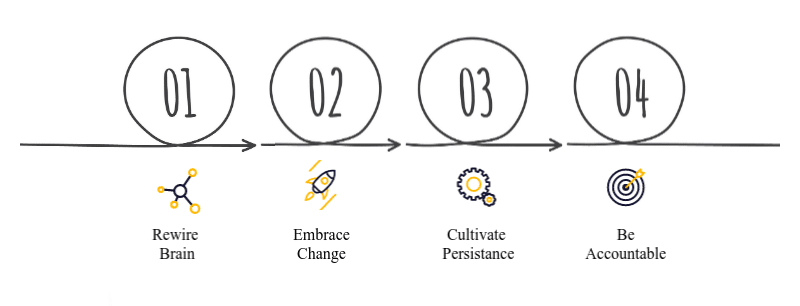Your 4-Step Guide to Harnessing The Power of Habit
In this article, we explore the science behind how habits formed, and look at practical steps you can take to cultivate new habits -ones that will help propel you toward the outcomes you desire!

Neuroplasticity refers to your brain’s remarkable ability to change and adapt. This means that your brain’s structure and function can be modified based on your experiences and behaviors.
Habit formation occurs through repetition and experience. When you repeatedly engage in a particular behavior or thought pattern, the neural pathways associated with that habit become strengthened. These pathways act like roads in your brain, facilitating the transmission of electrical signals and information.
Imagine walking through freshly fallen snow on a field. The first time you walk, the path is undefined and challenging. But if you continue along the same path, the snow gets compacted, and a clear path emerges. Similarly, when you repeat a behavior or thought, the neural pathways related to that habit become more defined and easier to follow. This is how habits become ingrained in your brain.

For example, let’s say you want to develop a habit of regular exercise. At first, it may feel challenging and require effort and discipline. However, as you continue to exercise consistently, the neural pathways associated with exercise become more established. Over time, it becomes easier and more automatic for you to engage in physical activity because your brain has rewired itself to support the new habit.
Step 2: Recognizing the Power of Your Habits and Embracing Change
Your habits profoundly impact your daily experiences, influencing thoughts, beliefs, actions, and your self-esteem. Whether positively or negatively, habits affect your results and shape your life in areas such as physical fitness, finances, and relationships.
For example, if you have a habit of consistently going for a run or hitting the gym, your thoughts are likely to be more positive, as exercise releases endorphins and boosts your mood. Your belief in your own capabilities increases, as you witness improvements in your strength and endurance over time. Your actions reflect a commitment to your long term well-being, as you prioritize fitness and make it a non-negotiable part of your routine.
On the other hand, if you have a habit of a sedentary lifestyle, the impact on your daily experiences is likely to be different. If you recognize the importance of exercise but aren’t taking action, your thoughts may include self-doubt or frustration. Your belief in your ability to improve your fitness levels may diminish and you may begin to see yourself as lacking discipline or motivation to make a change. In this scenario, the habit of not prioritizing exercise can shape your life in terms of reduced well-being and lower self-esteem.
Consistently repeating small, daily actions holds the power to shape your life in meaningful ways. It’s the cumulative effect of these steps that creates habits and leads to lasting change. Once you recognize the power of your habits, you can actively work towards cultivating positive ones that support your desired outcomes.
The key to achieving goals is to be committed to the end result rather than being attached to your habitual way of doing things.
By redirecting your energy and attention towards the end result, you allow for new possibilities, solutions, and resources to come into play.
And as you consistently take new actions, you build momentum, gain confidence, and find yourself naturally inclined to make bolder decisions and set higher aspirations.
It’s an ongoing process that requires dedication, mental discipline, perseverance, and self-reflection.
Step 3: Cultivating Persistence, Overcoming Resistance, & Navigating the First 30 Days
During the first 30 days of establishing a new habit, it’s common to experience a phase known as “the Dip.” The Dip is when staying consistent and committed can be challenging. And, it’s precisely during this time that the habit takes root and begins to become ingrained.
To navigate the first 30 days successfully, remain diligent and embrace the mindset of never giving up, even if a setback occurs.
Persistence is the secret ingredient in creating a new habit. It requires consistent action and daily practice to ingrain a new habit. Each day, commit to taking the small steps that will build your new habitual way of being.
It’s particularly powerful to take the new actions at the same time each day to firmly establish the pattern and reinforce new neural pathways. Over time, persistence becomes a habit in itself, solidifying your determination and your belief in yourself, and propelling you closer to your goals.
Celebrate each small victory along the way. Acknowledge and appreciate the progress you make, no matter how small it may seem. Each step forward contributes to building the foundation for powerful habits that shape your self-esteem, beliefs, and overall results. By recognizing and celebrating these victories, you reinforce your motivation and keep the momentum going.
To overcome any resistance you may encounter, stay focused on your compelling reasons for change and your ultimate goal. Your dedication and perseverance will serve as an inspiration to those around you and pave the way for positive change.
Step 4 – The Power of Accountability: Sharing Your Commitment to Habits That Support Your Goals
Sharing your new habits and commitments with others not only increases your own chances of success, it also empowers those around you to create habits that support their own life goals.
By sharing your newly created habits and commitments with supportive individuals, you can boost each other’s consistency.
Find yourself an accountability partner. The power of having someone by your side who understands your goals, supports your journey, and holds you accountable cannot be overstated.
It’s like having someone walk the path you created in the freshly fallen snow with you!

And the partnership goes both ways!
By becoming an accountability partner, you have the opportunity to build trust and connection and make a meaningful difference in someone’s life. Your support and encouragement can help them stay motivated, overcome challenges, and achieve their goals.
It benefits the person you support and also enriches your own life and community!
Being an accountability partner can be a way of paying forward the support you may have received on your own journey, allowing you to contribute to a cycle of personal growth.
Want to go deeper?
Listen in as Renee Cermak talks about the Power of Habit and how the actions you take on a daily basis generate your results. When you make a habit of daily action in alignment with your goals, you can begin to reap great rewards!

0 Comments